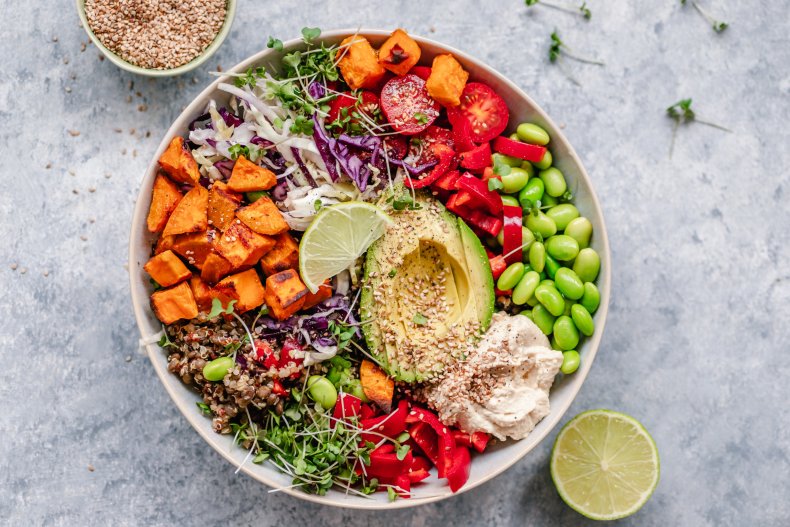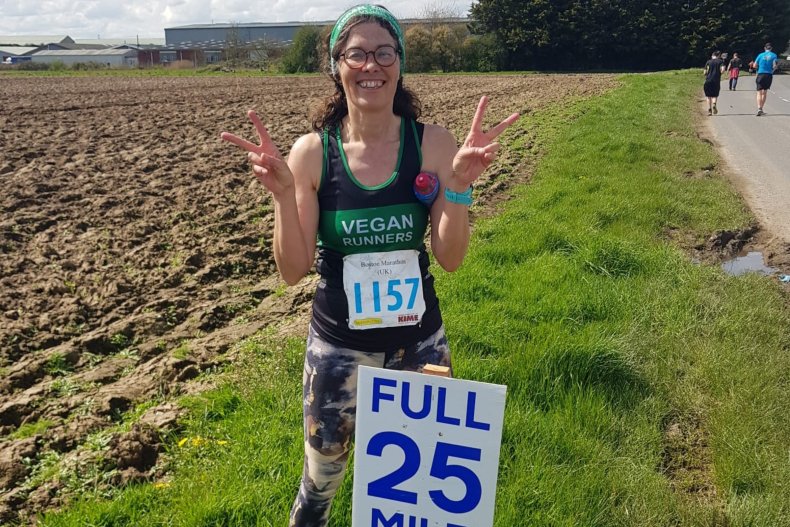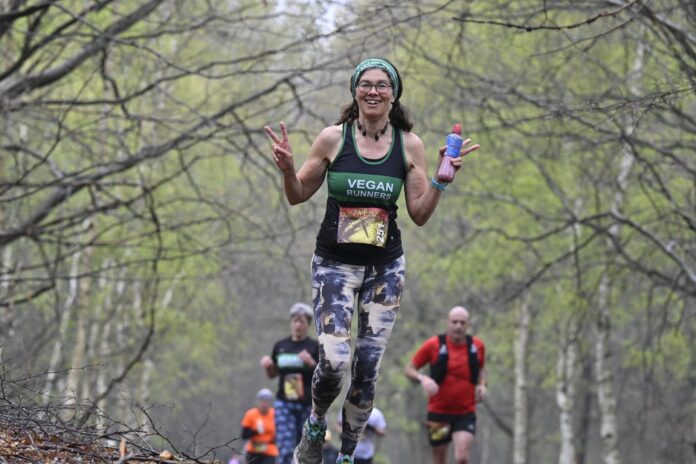I was in a field playing sports with my kids one summer 20 years ago when I pulled my back.
Initially, I didn’t think much about it, but by the end of the week it got worse and other joints began to flare up. At one point, I bent down to pick something off the ground and felt this pinging in my knee.
I stood up and watched it blow up like a cartoon right in front of my eyes.
Courtesy of Kate Dunbar
I thought it was exceptionally strange, and over the next few weeks, more and more joints began to swell.
It was incredibly painful—like someone was taking a knife to my joints and twisting it. I ended up spending the entire summer in bed, dosed up to my eyes in pain medication, unable to even turn over.
I could barely walk and got to the point where I forgot what it was like to sit down without being in pain. I ended up having to quit my job as a teacher; the whole situation was horrible.
At the time, I was recently divorced and very stressed. I had two young kids and wasn’t looking after myself. I didn’t sleep properly, eat well, or exercise.
Doctors thought at first that I had oligoarthritis, but I was later diagnosed with psoriatic arthritis, an autoimmune disease that causes joints to become swollen and painful, and can become progressively worse.
Eventually, I saw a rheumatologist who prescribed me methotrexate, a heavy immunosuppressant medication that is also used to treat cancer.
My treatment was really not very nice. I was having blood tests every month, and the medication I was taking was toxic and can damage the liver, amongst other side effects. I would be on that medication for the next 13 years.
Throughout that decade, there were occasions when my condition flared up and I had to increase my medication. At one stage I developed iritis in my left eye and had no idea what was going on. By the time I arrived at the hospital, the ophthalmologist didn’t know whether they would be able to save my eye.
Eventually, after a steroid injection into the eye, it calmed down and went away, but I later developed the same condition in both eyes. I had no idea what was causing my flare-ups, but started to notice that sometimes, if I ate certain foods, my joints would feel worse.
I asked my rheumatologist whether there could be any correlation between my condition and the food I was eating. “Diet has nothing to do with it,” he said.
But I’ve always been rebellious. Once I left I started hunting around for more information about psoriatic arthritis and diet. I found a few pieces discussing diet and the microbiome, and eventually brought it up once again with my rheumatology nurse.
She suggested trying an elimination diet, where I ate only simple foods like rice and apples. I soon found that some foods, including red meat, eggs, cheese, and stone fruits, would have a negative impact on me.
Coincidentally, around the same time I had come across the vegan society, and I began thinking more deeply about what I was eating. I have always loved animals, and been interested in the environment and nature.
I decided that I no longer wanted to eat animals, and became an ethical vegan, meaning I excluded all forms of animal products for ethical reasons, but would still eat some processed foods if they were vegan.
After a few years, I was able to cut my medication in half.

Getty Images
In 2017, I attended a vegan festival in London and had been enjoying the multitude of plant-based cheese and chocolate when I saw a vegan runner stall out of the corner of my eye.
I had recently attempted running for the first time—quickly finding my joints and my muscles were not geared up to do anything like running. Initially, I was running for about three steps, then walking, but I had slowly built my way up to around 30 meters.
I wasn’t planning on going up to the stall; after all, I wasn’t a runner. But I felt drawn to this woman, and decided to go over and just speak to her. She was busy tidying her stall as I told her that, whilst I would love to go running, I couldn’t because of my condition.
“Well, I used to have rheumatoid arthritis, but I went whole-food vegan. Now I run marathons,” she said.
I was stunned.
“You run marathons? But you’re on all of your medication aren’t you?”
When she told me she wasn’t, she had stopped taking them ten years ago, I burst into tears.
While comforting me, the woman encouraged me to try a whole-food diet, but I was hesitant. As a vegan I prided myself on being able to eat anything carnivores could; cupcakes, pies, and pastries. A whole-food diet meant cutting out a host of ingredients, including oils and salt.
But as I began to do more research, I decided it would be stupid not to try. Even if it didn’t work, it wasn’t going to do any harm.
The first week was tough. I haven’t got my head around how to use herbs and spices, and everything seemed quite bland.
But as time went on, my taste buds changed, and I learned how to make interesting dishes like curries and baked samosas. I was even able to make cakes sweetened with whole-food ingredients.
I started feeling really well. As an ethical vegan, I had already reduced my medication, but would occasionally still have flare-ups. After attempting to come off completely once before, I had come to the conclusion that I would be on medication for life, and could live with that.
But as I started my whole-food diet, I started reducing my medication even further. I started off taking four methotrexate pills, but after a month dropped one. Once I realized that nothing was happening, I waited another month and dropped another.

Courtesy of Kate Dunbar
I repeated the process until I was taking a quarter of one pill every week. Then, I decided to stop taking them altogether. Nothing happened, I felt absolutely fine. I was completely gobsmacked, this was incredible.
By this point, I had joined a group called Vegan Runners and had managed to take part in a 10K race.
At my next and last rheumatology appointment, I presented my doctor with my medal, as well as lots of research into plant-based health, and told him I was off my medication entirely.
He just slumped back in his chair. The look of surprise on his face was absolutely fantastic.
Now, I am five years free of medication and completely in remission. I have to pinch myself when I am telling this story because it feels like the life of someone else. Going from all of that pain and suffering to becoming someone who is not only able to run, but to find such joy in that, fills me with so much happiness.
Around a month ago I ran a marathon and the amazing people I have met through running and veganism supported me all the way.
I’m currently an ambassador for Running on Plants— a free challenge to improve your running performance using plant-based recipes—and cannot believe that I am associated with so many established athletes.
It’s really bizarre, but it makes me grateful that I wasn’t an athlete when I was young. My personal bests are anything but behind me. I’m now nearly 60 years old and still getting faster.
While I cannot promise that every disease can be improved through diet, I would encourage anyone experiencing something similar to what I was to just try—you’ll likely feel better either way.
Furthermore, if you have one autoimmune condition, you are more likely to develop another, so I believe that in itself is a good incentive to try and control your disease through diet and lifestyle.
Side effects from drugs can also be very debilitating, which is a good reason to try and reduce or come off them if possible. However, I would always recommend taking your medication when you need it.
For me, methotrexate gave me time. It allowed me to quickly dampen down the disease while I researched what kind of diet would work for me, and reduced the chances of the condition causing any lasting damage to my body.
I know that if I began eating badly again, I would start getting sick. Though my disease is never actually gone, it has been kicked into the dust right now, so I’m very lucky.
To anyone experiencing what I did, my advice would be to read. Find out all you can about your particular disease and diet. Learn about plant-based nutrition, because there are so many wonderful people out there who are so knowledgeable.
I understand exactly how awful chronic pain is, but there is so much advice out there; don’t give up hope. When you’re ill, it’s easy to fall into a very dark place—as I did that first summer—but have hope that you’re going to feel better.
Kate Dunbar is a patient advocate for Plant Based Health Professionals UK and an ambassador for Running on Plants.
All views expressed in this article are the author’s own.
As told to Newsweek’s My Turn associate editor, Monica Greep.
Do you have a unique experience or personal story to share? Email the My Turn team at [email protected].


